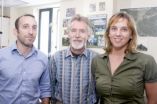(Press-News.org) (Santa Barbara, Calif.) –– Working with researchers at the University of Pittsburgh and the Cincinnati Children's Hospital, anthropologists at UC Santa Barbara have found high levels of beneficial omega-3 fatty acids in the breast milk of economically impoverished Amerindian woman as compared to women in the United States. Their research appears in the current issue of the journal Maternal and Child Nutrition.
The study compared breast milk fatty acid composition in U.S. and Tsimane women. The Tsimane live in Amazonian Bolivia, and eat a diet consisting primarily of locally grown staple crops, wild game, and freshwater fish. Samples of Tsimane mothers' milk contained significantly higher percentages of the omega-3 fatty acid docosahexaenoic acid (DHA), which is crucial for infant cognitive and visual development.
Additionally, the percentages of DHA in breast milk did not significantly decrease across the first two years postpartum, the period during which infant brains experience peak growth and maximal uptake of DHA. This was also true for the U.S. women, and the study suggests that extended breastfeeding by both U.S. and Tsimane mothers may provide infants with a constant source of DHA during the critical period of brain development.
"The fatty acid composition of breast milk varies with the fatty acid composition of a mother's diet and fat stores. Ancestral humans likely consumed omega-6 and omega-3 fatty acids in equal proportions," said Melanie Martin, a doctoral student in UCSB's Department of Anthropology, and the study's lead researcher. "Tsimane mothers' omega-6 to omega-3 ratios were four to one, much closer to the ancestral estimates than observed in U.S. women."
Unfortunately, the ratio of omega-6 to omega-3 in industrialized diets varies from 10 to 1 to as high as 20 to 1. This is most likely due to the absence of fresh fish, and regular consumption of processed foods and vegetable oils rich in linoleic acid (an omega-6), as well as trans fats. These high levels of omega-6 have been linked to increased risks of obesity, inflammation, and cardiovascular disease, and interfere with the synthesis of DHA and other omega-3 fatty acids.
"The Tsimane mothers' average milk DHA percentage was 400 percent higher than that of the Cincinnati mothers, while their average percentages of linoleic and trans fatty acids were 84 percent and 260 percent lower, respectively," said Martin. "Despite living in economically impoverished conditions, Tsimane mothers produce breast milk that has more balanced and potentially beneficial fatty acid composition as compared to milk from U.S. mothers."
The study comes in the wake of the May 21 issue of Time magazine, which reignited debate over the appropriate age at which a child should top nursing. "Buzz about the recent Time magazine cover missed the point," noted Steven Gaulin, professor of anthropology at UCSB, and one of the study's co-authors. "The American diet is eroding one of the most important benefits breast milk can provide –– fats that are critical to infant brain development. It's not surprising that, among developed nations, American children are last on international tests of math and science."
The study's findings highlight important questions about infant formula, the fatty acid content of which is based on the breast milk of U.S. mothers. "The study suggests that standards of fatty acid composition for infant formulas should be derived from populations such as the Tsimane," Martin explained. "And nutritional recommendations for infants should account for the prolonged requirements of fatty acids that breast milk naturally provides."
INFORMATION:
Also contributing to the study was Michael Gurven, professor of anthropology at UCSB.
UCSB anthropologists finds high levels of omega-3 fatty acids in breast milk of Amerindian women
2012-06-11
ELSE PRESS RELEASES FROM THIS DATE:
New York Medical Malpractice Law Firm Trolman, Glaser & Lichtman Received $2.6 Million Settlement for Baby Injured at Birth
2012-06-11
Medical malpractice attorney Evan Goldberg of Trolman, Glaser & Lichtman in New York City recently secured a recovery of $2.65 million for a baby born with brain damage as a result of obstetrical mismanagement (see index #350306/2009 Bronx County, New York.).
During her pregnancy, the baby's mother experienced hypertension and diabetic health concerns, but her physicians failed to properly monitor those conditions. During labor it became apparent that the baby was not receiving enough oxygen, but the physicians chose not to perform a caesarian section (C-section) ...
AGU: Unique microbes found in extreme environment
2012-06-11
WASHINGTON – Researchers who were looking for organisms that eke out a living in some of the most inhospitable soils on Earth have found a hardy few. A new DNA analysis of rocky soils in the martian-like landscape on some volcanoes in South America has revealed a handful of bacteria, fungi, and other rudimentary organisms, called archaea, which seem to have a different way of converting energy than their cousins elsewhere in the world.
"We haven't formally identified or characterized the species," said Ryan Lynch, a microbiologist with the University of Colorado in Boulder ...
Raleigh Family Law Attorney Ashley Oldham Encourages Those Considering Divorce to "Get Organized and Have a Plan"
2012-06-11
Divorce attorney Ashley Oldham of Roberts Law Group, joined Marti Skold of News 14 to discuss the annual early spring surge in divorces: "Couples often wait until after the holidays to make the decision to get a divorce," explained Oldham. The number of divorce filings typically begins to rise in January, peaking in mid-March. The holiday season, New Year's resolutions and the return of tax time "put unique stressors on couples," likely contributing to the rise in divorce filings in the first few months of a new year.
When considering divorce, Oldham ...
More can mean less when it comes to being happier – especially if you are neurotic
2012-06-11
New research from the University of Warwick suggests getting more money may not make you happier, especially if you are neurotic.
In a working paper, economist Dr Eugenio Proto, from the Centre for Competitive Advantage in the Global Economy (CAGE) at the University of Warwick, looked at how personality traits can affect the way we feel about our income in terms of levels of life satisfaction.
He found evidence suggesting that neurotic people can view a pay rise or an increase in income as a failure if it is not as much as they expected.
Neuroticism is a fundamental ...
In a post-hoc analysis, elderly patients with type 2 diabetes experienced less hypoglycemia and similar blood sugar reductions with JANUVIA compared to sulfonylurea
2012-06-11
WHITEHOUSE STATION, N.J., June 9, 2012 – Merck (NYSE: MRK) (known as MSD outside the United States and Canada) today announced results of a post-hoc pooled analysis in which patients with type 2 diabetes age 65 or older treated with JANUVIA® (sitagliptin) 100 mg/day achieved similar blood sugar reductions as those treated with a sulfonylurea, with significantly less hypoglycemia (low blood sugar).
JANUVIA is indicated, as an adjunct to diet and exercise, to improve glycemic control in adults with type 2 diabetes mellitus. JANUVIA should not be used in patients with ...
Sleep deprivation may lead to higher anxiety levels, fMRI scans show
2012-06-11
DARIEN, IL – New research shows that sleep loss markedly exaggerates the degree to which we anticipate impending emotional events, particularly among highly anxious people, who are especially vulnerable.
Two common features of anxiety disorders are sleep loss and an amplification of emotional response. Results from the new study suggest that these features may not be independent of one another but may interact instead.
Researchers from the Sleep and Neuroimaging Laboratory at the University of California, Berkeley, used brain scanning on 18 healthy adults in two separate ...
Scaffolding Law Reform in New York Attempted Again
2012-06-11
It seems like every year tort reform advocates and some state lawmakers in New York try to pass legislation that would change the state's scaffold law. Unfortunately, 2012 is turning out to be no different.
A bill has been proposed that would change the protections provided to workers under the state's scaffold law, Labor Law Section 240(1). Under the current scaffold law, property owners and employers in New York bear absolute liability when construction workers are injured in accidents that involve any heights, such as scaffold, ladder and even stairway accidents. ...
MRI scans show how sleep loss affects the ability to choose proper foods
2012-06-11
DARIEN, IL – MRI scans from a study being presented today at SLEEP 2012 reveal how sleep deprivation impairs the higher-order regions in the human brain where food choices are made, possibly helping explain the link between sleep loss and obesity that previous research has uncovered.
Twenty-three healthy adults participated in two sessions using functional magnetic resonance imaging (fMRI), one after a normal night's sleep and a second after a night of sleep deprivation. In both sessions, participants rated how much they wanted various food items shown to them while they ...
Brain scans show specific neuronal response to junk food when sleep-restricted
2012-06-11
DARIEN, IL – The sight of unhealthy food during a period of sleep restriction activated reward centers in the brain that were less active when participants had adequate sleep, according to a new study using brain scans to better understand the link between sleep restriction and obesity.
Researchers from St. Luke's – Roosevelt Hospital Center and Columbia University in New York performed functional magnetic resonance imaging (fMRI) on 25 men and women of normal weights while they looked at images of healthy and unhealthy foods. The scans were taken after five nights in ...
Updated Medical Certification Guidelines for New York CDL Holders
2012-06-11
At the end of January a new federal regulation took effect that requires all New York commercial driver's license holders (CDL) to have a medical certification in order to legally operate their vehicles.
The medical certification must be issued by a doctor on a Department of Transportation approved form, and must state that the driver is physically able to operate a commercial motor vehicle. Typically the certification will be valid for two years, but can be good for a shorter period of time depending on the driver's medical condition. Only exempt personnel, like school ...



